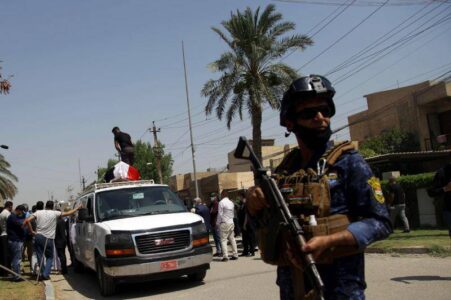
Kata’ib Hezbollah terrorist suspected in killing of Iraqi security analyst Hisham al-Hashemi
Gunmen in Baghdad shot dead a well-known former government adviser and political analyst near his home on Monday in a rare high-profile killing in the Iraqi capital, government officials, police sources and medics said.
Government officials described the killing of Hisham al-Hashemi, who had written about politics, ISIS and the role of Iran-backed militias in Iraq, as a targeted killing but did not point the finger at any particular group or militia.
There was no immediate claim of responsibility for Hashemi’s killing.
But Iraqi activist Ghaith al-Tamimi told US-based Alhurra network that Hashemi had received death threats from the pro-Iranian hardline faction Kata’ib Hezbollah.
“I need your urgent advice … Kata’ib Hezbollah has threatened to assassinate me,” Hashemi told Tamimi in a WhatsApp exchange less than a month ago.
Tamimi said he told Hashemi to leave Iraq “by any means.” The political analyst seemed at first to heed the advice then changed his mind and decided to stay.
“I will not be quiet and take part in your killing by concealing evidence from the public,” Tamimi said in a tweet.
The assassination comes at a time of rising tension between the new government of Prime Minister Mustafa al-Kadhimi and powerful Iran-backed militias and political parties who oppose him and accuse him of siding with the United States.
Police sources said two gunmen on a motorbike carried out the killing, with one shooting him outside his house in the Zayouna district in eastern Baghdad.
Weeks before his death, Hashemi told confidantes he feared Iran-backed militias were out to get him and that he has a direct threat from Iraqi pro-Iran militia Katai’b Hezbollah. Friends had advised him to flee to the northern city of Erbil, in the semi-autonomous Kurdish region.
Hashemi, who was well-connected with politicians, activists and paramilitary officials, worked as an adviser to former Prime Minister Haider al-Abadi and informally with the government of Kadhimi, a government official said.
News of Hashemi’s killing spread quickly, with fellow researchers, journalists and others taking to social media to express their condolences.
Kadhimi issued a statement offering his condolences and saying Iraqi security forces would “spare no effort” in pursuing Hashemi’s killers.
“We will work with all our efforts to confine arms to the state, so that no force will rise above the rule of law,” the statement said.
The head of the United Nations Assistance Mission for Iraq, Jeanine Hennis-Plasschaert, expressed shock at the assassination and said the UN strongly denounces the “cowardly act.”
In a tweet, she called on the Iraqi government to quickly find the perpetrators and bring them to justice.
British Ambassador to Iraq Stephen Hickey said he was “devastated and deeply saddened” by the news of Hashemi’s death.
“Iraq has lost one of its very best – a thoughtful and brave man,” he tweeted.
Iraqi researcher Fanar Haddad said Hashemi was a “strikingly bright mind and a true gentleman,” calling his death a “major loss and an unforgivable crime.”
Asked what Hashemi’s death might signify to critical analysts, he said, “Critical voices are liable to be silenced if and when deemed necessary.”
Political analyst Ihsan al-Shammari, a colleague of Hashemi, said those who killed him wanted to “silence the voices that disagree with their opinion” and blamed the shooting on the proliferation of armed groups in the country.
Many saw his death as a worrying sign as the government struggles to rein in militias.
Iraq’s new prime minister has come under increasing pressure from Iran-aligned militias since he took office in May.
An arrest raid that targeted one of the most hardline Iran-backed militias last month angered paramilitary groups, which pressed the government to release those detained.
Most of the militiamen were released almost immediately.
Kadhimi presides over a government which must balance the competing interest of the United States and Iran, Iraq’s two main allies.
The United States wants the Iraqi government to put a stop to regular rocket attacks on US facilities, which Washington blames on Iran-backed militias.
Iran’s allies in Iraq demand a withdrawal of US troops from the country, which the United States invaded in 2003, toppling Saddam Hussein and paving the way for Iran to entrench its influence over Baghdad.
Kadhimi took office after being viewed as acceptable to both sides.
Source: The Arab Weekly





